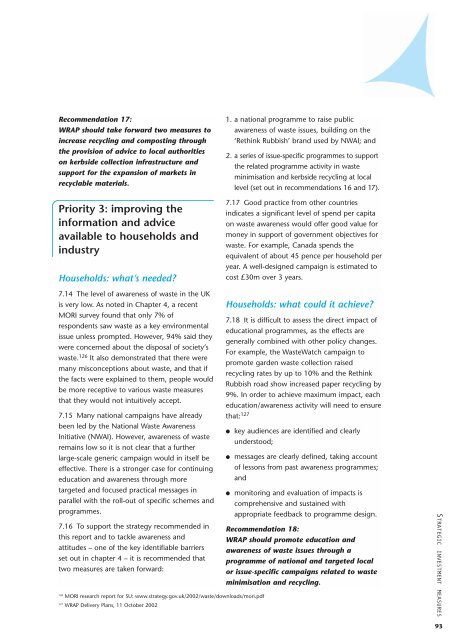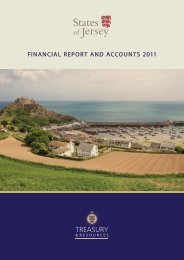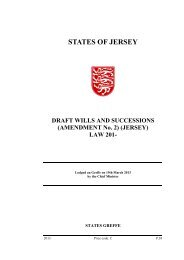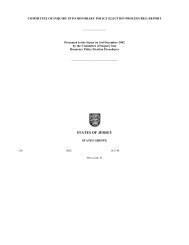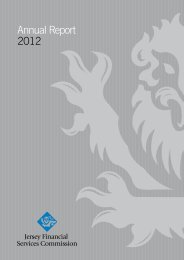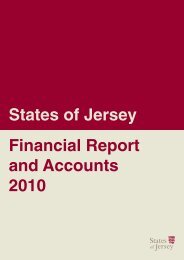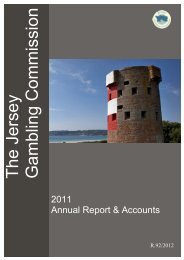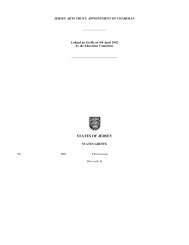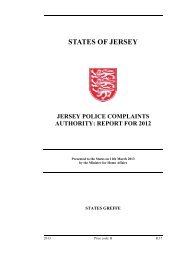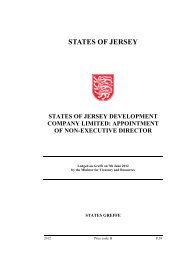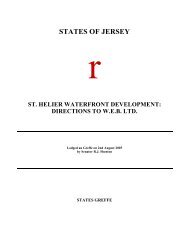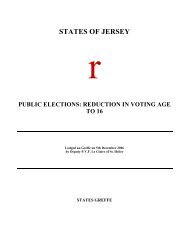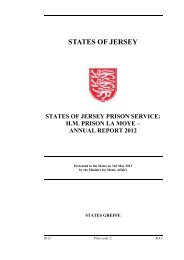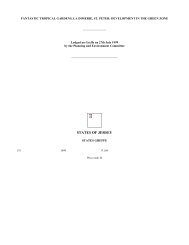Waste not want not - States Assembly
Waste not want not - States Assembly
Waste not want not - States Assembly
You also want an ePaper? Increase the reach of your titles
YUMPU automatically turns print PDFs into web optimized ePapers that Google loves.
Recommendation 17:<br />
WRAP should take forward two measures to<br />
increase recycling and composting through<br />
the provision of advice to local authorities<br />
on kerbside collection infrastructure and<br />
support for the expansion of markets in<br />
recyclable materials.<br />
Priority 3: improving the<br />
information and advice<br />
available to households and<br />
industry<br />
Households: what’s needed?<br />
1. a national programme to raise public<br />
awareness of waste issues, building on the<br />
‘Rethink Rubbish’ brand used by NWAI; and<br />
2. a series of issue-specific programmes to support<br />
the related programme activity in waste<br />
minimisation and kerbside recycling at local<br />
level (set out in recommendations 16 and 17).<br />
7.17 Good practice from other countries<br />
indicates a significant level of spend per capita<br />
on waste awareness would offer good value for<br />
money in support of government objectives for<br />
waste. For example, Canada spends the<br />
equivalent of about 45 pence per household per<br />
year. A well-designed campaign is estimated to<br />
cost £30m over 3 years.<br />
7.14 The level of awareness of waste in the UK<br />
is very low. As <strong>not</strong>ed in Chapter 4, a recent<br />
MORI survey found that only 7% of<br />
respondents saw waste as a key environmental<br />
issue unless prompted. However, 94% said they<br />
were concerned about the disposal of society’s<br />
waste. 126 It also demonstrated that there were<br />
many misconceptions about waste, and that if<br />
the facts were explained to them, people would<br />
be more receptive to various waste measures<br />
that they would <strong>not</strong> intuitively accept.<br />
7.15 Many national campaigns have already<br />
been led by the National <strong>Waste</strong> Awareness<br />
Initiative (NWAI). However, awareness of waste<br />
remains low so it is <strong>not</strong> clear that a further<br />
large-scale generic campaign would in itself be<br />
effective. There is a stronger case for continuing<br />
education and awareness through more<br />
targeted and focused practical messages in<br />
parallel with the roll-out of specific schemes and<br />
programmes.<br />
7.16 To support the strategy recommended in<br />
this report and to tackle awareness and<br />
attitudes – one of the key identifiable barriers<br />
set out in chapter 4 – it is recommended that<br />
two measures are taken forward:<br />
126<br />
MORI research report for SU: www.strategy.gov.uk/2002/waste/downloads/mori.pdf<br />
127<br />
WRAP Delivery Plans, 11 October 2002<br />
Households: what could it achieve?<br />
7.18 It is difficult to assess the direct impact of<br />
educational programmes, as the effects are<br />
generally combined with other policy changes.<br />
For example, the <strong>Waste</strong>Watch campaign to<br />
promote garden waste collection raised<br />
recycling rates by up to 10% and the Rethink<br />
Rubbish road show increased paper recycling by<br />
9%. In order to achieve maximum impact, each<br />
education/awareness activity will need to ensure<br />
that: 127<br />
●<br />
●<br />
●<br />
key audiences are identified and clearly<br />
understood;<br />
messages are clearly defined, taking account<br />
of lessons from past awareness programmes;<br />
and<br />
monitoring and evaluation of impacts is<br />
comprehensive and sustained with<br />
appropriate feedback to programme design.<br />
Recommendation 18:<br />
WRAP should promote education and<br />
awareness of waste issues through a<br />
programme of national and targeted local<br />
or issue-specific campaigns related to waste<br />
minimisation and recycling.<br />
STRATEGIC INVESTMENT MEASURES<br />
93


